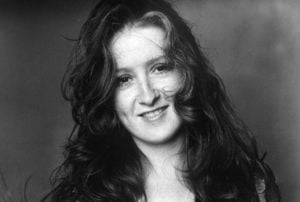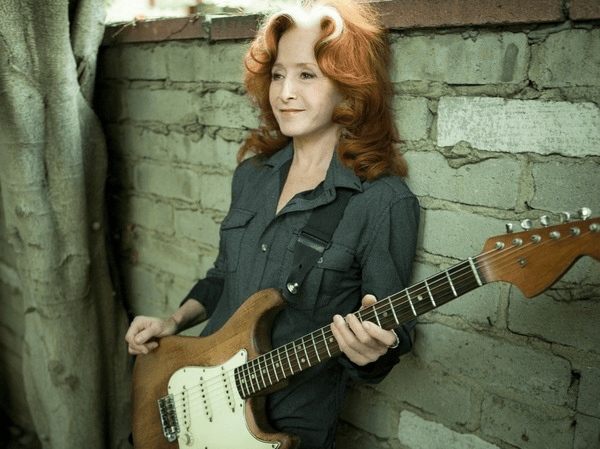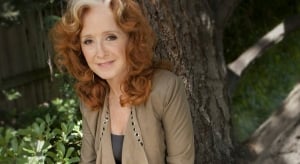
American country blues singer-songwriter Bonnie Lynn Raitt has been making high-class music across five decades, amassing a host of awards and selling albums to a constantly growing band of followers who adore her gritty lyrics, superb guitar playing and lived-in voice.
Hard to believe but the excellent American country blues singer-songwriter Bonnie Lynn Raitt has been making high-class music across five decades, amassing a host of awards and selling albums to a constantly growing band of followers who adore her gritty lyrics, superb guitar playing and lived-in voice.
Hailing from the heart of Burbank, California Bonnie Raitt has enjoyed many fruitful liaisons with everyone from Little Feat and John Hiatt to Bruce Hornsby, Don Was to John Lee Hooker. Her fans love the fact she’s been through good and bad times and faced up to life and her career with refreshing candour that never borders on self-pity or regret. Without reinventing herself as such Raitt has seen musical trends come around to her way of thinking and is adept at embracing new sounds that suit her style. She is a formidable artist – a force of nature – and she ain’t giving up.
As a young and ardent follower of what would later be called Americana, Bonnie Raitt steeped herself in blues, folk and country-pop from an early age. The daughter of Broadway musical star John Raitt with a piano-playing mother Raitt enjoyed the kind of background where she was encouraged to develop her skills as a bottleneck guitarist – and this at a time when women in the music industry were, if not few and far between, certainly unlikely to be following that particular route. Her early albums brought her into contact with Lowell George and Bill Payne from Little Feat and she was able to communicate with them as an equal. Her early albums won considerable acclaim but sales were slower to materialise. The album Home Plate did cause a ripple however as she went in to bat for her sex and fond mainstream publications like Rolling Stone keen to listen up.
The aptly named Nick of Time arrived at the end of the 1980s and was so acclaimed and sold so well that three Grammy Awards arrived. Such success wasn’t exactly belated but it was long overdue recognition for Best Female Pop Vocal Performance, Best Rock Vocal Solo and Best Rock Group Vocal performance which Bonnie sent producer Don Was up to collect. Nick of Time has sold over five million copies to date and stands repeated listening today nearly 25 years after it was conceived. Mixing Raitt originals with excellent covers like John Hiatt’s ‘Thing Called Love’ and Bonnie Hayes’ ‘Love Letter’, Nick of Time called on a cast of West Coast stars like Ricky Fataar, Jay Dee Maness, Herbie Hancock and the ever-reliable Graham Nash and David Crosby, as well as Don Was favourites like Sweet Pea Atkinson and Harry Bowens. Three singles emerged that included the title track that became an anthem in 1989 and a rallying cry for women in the industry.
1991’s Luck Of The Draw found Raitt booking into her own form of songwriter’s boot camp. Amazed herself at her newfound stardom and anxious not to mar the moment nor slip into formula she retained Don Was and braced herself for some serious touring to hone the tracks on the album with roadwork rather than developing her studio tan. The trick paid off because Luck Of The Draw surpassed its predecessor and has sold over seven million copies.
This time the catalyst for the main event was a splendid Grammy Award-winning duet with the great Delbert McClinton (backing vocals by Glen Clark) on the Cecil and Linda Womack R&B epic ‘Good Man, Good Woman’, the perfect vehicle for Bonnie and a raw and rough voiced suitor like Delbert. If anything she now got even more favourable reviews and when you hear her take on Paul Brady’s title cut or thrill to the emotional terrain she crosses during ‘Tangled and Dark’ and ‘Come to Me’ you’ll want to join her journey.
Bonnie and Was concentrated again on finding the right specialists. Here you’ll enjoy the magnificent Tower of Power horns, Ian McLagan’s signature organ sound, Kris Kristofferson’s backups and Richard Thompson’s fluent guitar lines. Nothing lucky about this album, it’s a stone classic. Brady was also key to penning the hit single ‘Not the Only One’, which like everything else here hung around the charts for nigh on two years.
While Bonnie held fire for three years before returning to the writing desk with Don Was she was due a period of reflection because while in this phase of her career she was still coming to terms with the pressures of fame over the piece she was up to album number twelve.
In any case Longing in Their Hearts (1994) didn’t disappoint. The album starts with Little Jimmy Scott’s ‘Love Sneakin’ Up On You’ and the strongest possible arrangement this eccentric track warrants helped propel it towards the top of the US charts. Many of the same personnel remained on hand. Benmont Tench from Tom Petty and the Heartbreakers was a new recruit; Levon Helm arrived to add Band-like gravitas and Was paid special heed to the rhythm and horn sections. Raitt’s UK following, which has always been large and loyal, picked up on the song ‘You’, giving Bonnie a Top 40 hit here while British folk-rock lovers were delighted to hear the lady tackle Richard Thompson’s classic ‘Dimming of the Day’.
The live album Road Tested (a double album plus in the old money) restored Raitt’s status amongst those who might have missed her brilliantly conceived shows. The thing to remember here is that while album sales certainly kicked Raitt towards a new platform she never lost sight of her roots.
While live albums are often viewed as an adjunct to the main meal that isn’t the case here. Road Tested is an extraordinary document and remains completely underrated. Consider that Bonnie takes on the Talking Heads in ‘Burning Down The House’ and grabs the funky groove with panache, then contrast that with her version of John Prine’s lush ‘Angel from Montgomery’ or the Crusaders’ ‘Never Make Your Move Too Soon’. This isn’t sitting back and soaking up the applause stuff, this is deliberately cutting edge, sharp and challenging fare that nods back to her hero Mississippi Fred McDowell and also embraces newer blues guys like Chris Smither. Special mention too for Raitt’s long-time rhythm section – drummer Ricky Fataar – the erstwhile Beach Boy– and bassist James ‘Hutch’ Hutchinson – also pianist Bruce Hornsby who popped up on several key dates of Bonnie’s US tour.
Now generally when an artist completes a cycle of meritorious work with a neatly career-defining live album set harsher critics tend to move off and look for the next big thing but in the case of Fundamental, Bonnie’s last album of the last millennium, the smart money rallied behind her even though she’s split from Don Was and called in the super tag team of Tchad Blake and Mitchell Froom. It was time for a change – no one wants to stay still and Raitt doesn’t on this tight and treasured disc. Her penchant for a John Hiatt tune is a constant though and his clever, wordplay packed ‘Lover’s Will’ grounds the album at heart and provides a smart element of soul. Blues, Tex Mex, border ballads and straight in your face Delta nuggets flood about as the artist confronts the ageing up process and the perils of relationships in the hard-hitting ‘Spit of Love’ and ‘I’m On Your Side’.
Four years on and we’re proud to offer up Silver Lining. This diverse set mixes African gospel chorale, talking drums and a slew of new sounds brought to the table by Raitt’s collaborator Jon Cleary who writes, duets and propels the melodies on a staggering array of Moogs, clavinets and Wurlitzer. The keyboard is the instrumental centre of this album but the variety of colours is enhanced by tuba, gut-string guitar, balafon and loops. It’s Bonnie’s most deliberately ‘modern’ album but she wins the right to tackle something new by virtue of the strength of writing and performance.
Souls Alike continues to mine that more progressive vein although country lovers will recognise names like Lee Clayton, Randall Bramblett and Wayne Kirkpatrick cropping up in the credits. Bonnie cuts back here and après the sound to a more basic approach that highlights her ever-improving voice, her acoustic guitar abilities and some startling slide licks.
Throughout this period Bonnie continues to garner awards, Grammy gongs flowed for Luck Of The Draw and the nominations never dried up. To take the overview on this fine life and career then we suggest The Best of Bonnie Raitt: On Capitol 1989-2003, an 18-string marvel that fills in all the essentials and should whet the appetite for some seriously deep mining.
We should also mention that Ms Bonnie Raitt hasn’t confined herself to music alone, or even made any big deal about her role in upping the ante for women in her field – that’s not really her style. But she is synonymous with some important movements – not least of which is her part in The No Nukes effort. A confirmed environmentalist from the off – long before the albums cited here in fact – Bonnie Raitt is a formidable force. She’s an adult in a business that can be frivolous. Not to say she’s any kind of proselytiser. She is a sterling artist. She’s Bonnie Raitt, ’nuff said.
Words: Max Bell











 Visitors Today : 74
Visitors Today : 74 Now Online : 1
Now Online : 1



































































































